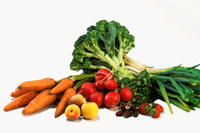Weight Loss - A High Fibre Diet
By going on a high fibre diet a person will find it extremely helpful if they have a colon or digestive tract problem. Fibre is a great cleanser of the digestive tract and by aiding and speeding up the excretions and toxins from their body it can relieve the person of the daily hassles of constipation and help that poor unlucky person who suffers from IBS - Irritable bowel syndrome.
The function of fibre
Fibre has a main function and this is to keep the digestive tract healthy and operating properly, thus preventing waste from sitting in the intestines to long and causing a build up of waste which can cause bowel problems and lead to some diseases.
Types of fibre
Insoluble fibre
Soluble fibre
About Insoluble fibre
Insoluble fibre along with the digested material can pass through most the bowel system unchanged, when this fibre arrives at the large intestine it promotes the growth of "friendly" bacteria which helps ferments the waste material making it soft and giving the waste a bit of bulk. This large soft stool is easier to evacuate, preventing constipation and IBR (to name but a few) as it does not stay in the bowel long enough to allow toxins to build up.
Where to find insoluble fibre
There are plenty of sources for this valuable fibre a few examples are - bran, wholemeal flour and breads, brown rice, whole grain cereals, vegetables, edible peels of fruit, nuts and seeds.
About Soluble fibre
This fibre is thought to be able to reduce the level of cholesterol as it binds the fats causing cholesterol to itself and due to the fact that it cannot be digested it gets eliminated through the bowel and prevents the bad fats from being absorbed into the bloodstream. The fibre also helps in the slowing down of digestion thus preventing the sudden release of energy(glucose) from the carbohydrates and therefore maintaining a stable blood sugar level (good for people with diabetes) and preventing sudden feelings of tiredness, hunger pangs and lack of energy. The most important though is that soluble fibre absorbs water in the intestine and assists with softening the stool for a easier evacuation.
Where to find soluble fibre
Soluble fibre can be found in the following: fruits, vegetables, lentils, peas, beans, oats, barley, oatmeal, potatoes, dried fruit, soya milk and soya products.
Sources of low fibre foods
The following foods do not contain much in the way of fibre, in fact some have none at all: refined cereals and white bread, meat and animal products, dairy produce and fast foods. Eating these in large amounts can lead to bowel irregularities and stomach discomfort.
Daily recommended intake
Take in as much as 35g of both soluble and insoluble fibre a day if you can, 18g a day is adequate but the more you eat this fibre the better your bowels will feel. Remember if you are increasing the amount of fibre in your diet do it gradually, you will also need to increase your water intake, this is to allow for the extra absorption from the extra fibre.
We have discussed the amount of fibre you need but now we say that too much is not good for you. Strange but true, too much fibre can have a negative impact as important minerals such as zinc, calcium and iron can sometimes bind to the fibre and get eliminated via waste before being absorbed into the bloodstream. This can lead to a diet deficiency and cause all sorts of health problems.
Is too much fibre bad for you?
Just as too little fibre in the diet is not good for the body, too much fibre can also have a negative impact.
Too much fibre can lead to a deficiency in important minerals such as zinc, calcium and iron. These minerals sometimes bind to the fibre, which is then eliminated from the body without allowing the minerals to be absorbed into the bloodstream.
Can I lose weight by eating fibre rich foods?
No - you are not going to lose those extra pounds as quickly as you would like but as this diet is low in fat and calories it will not make you put on weight. It will also slow down your digestion which is a plus as you will feel fuller for longer and not be inclined to eat those tasty, unhealthy and fattening snacks as you used to, the fibre rich food is also bulky so it fulls you up quicker thus preventing overeating. In the long run this will help with weight loss but you will have to be patient.
How to introduce more fibre into your diet
* Breakfast should be porridge, high fibre cereals or wholemeal bread.
* Increase your portions of fruit and/or dried fruit.
* Don't peel potatoes whenever possible.
* Try adding chickpeas or lentils to salads, stews and curries.
* Eat more raw fruit and/or vegetables.
* Eat seeds and nuts as a snack and try to add to salads.
* Change to the healthier brown rice, brown bread and wholemeal pasta.
* Try buying foods containing whole grains.
REMEMBER - drink more water with this diet!
-
Is an Ideal Body Weight Always Accurate?
Determining your ideal body weight can be as easy as looking for your
-
The Best Diet Foods That Will Help You To Lose Weight
With all the toxicities modern life brin
-
Your sleeping position affects your brain and overall health
Tossing and turning, getting cocooned by the sheets, or waking
-
The Language Of Weight Control
I would guess you are familiar with the video recorder and I am sure y
-
The Benefits of Learning to Cook Indian Cuisine
There are countless options for taking cooking classes in Miami, an
-
To Men Who Want To Convince Their Wife To Loose Weight -- But Cant Get Started
For many men the subject of their wifes weight is something that they
- DON'T MISS
- Some Weight Loss Techniques That You Must Know
- Men’s Health Week: Kidney stones, restless legs syndrome, prostate cancer, and low testosterone
- Website On How To Lose Weight Fast
- Uncover The Fastest Method To Get Rid of Stomach Fat
- 3 Things You Need To Know About Drinking Water To Create Guaranteed Weight Loss
- Healthy Weight Loss Tips for Men
- Face It – You’re Fat! Lose The Pounds At Rocket Speed With This Fast Weight Loss Diet Plan
- La Jolla Weight Loss Programs
- Acai Fresh fruit Effects You’ll Want To Understand
- Hoodia And Phentermine-Don't Play Russian Roulette




